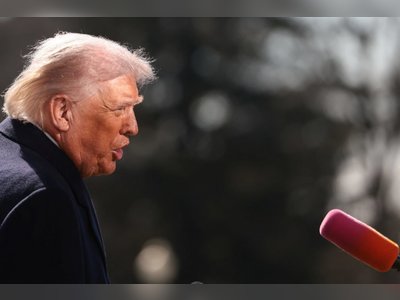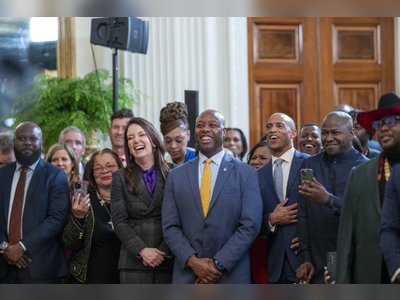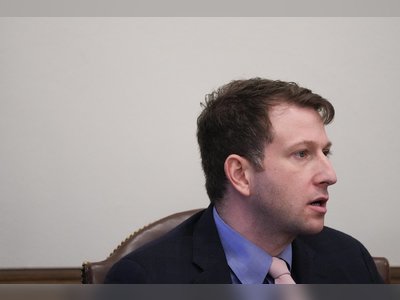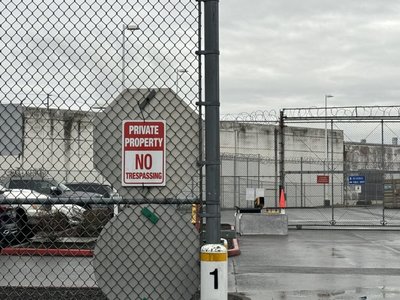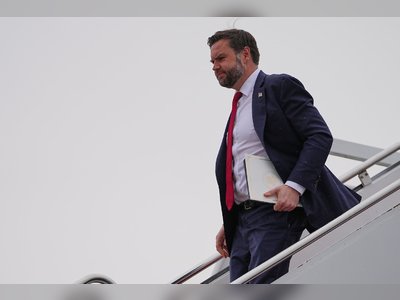Western Allies Commit $2bn in Additional Military Aid to Ukraine Amid Ongoing Conflict
Ukraine secures further support from 34 nations as war with Russia continues, despite impending geopolitical shifts.
In a decisive meeting held in Germany on Thursday, the Ukraine Defense Contact Group (UDCG) pledged an additional $2 billion in military support to Ukraine, underscoring continued international backing as Ukraine confronts Russia's ongoing aggression.
Ukrainian President Volodymyr Zelenskyy announced the development following the meeting, which drew participation from 34 countries.
This new aid package includes crucial support in air defense, information technology, demining, naval, air force, and artillery sectors.
President Zelenskyy, speaking to the My-Ukraina television channel, emphasized the importance of sustained support from western allies, especially as geopolitical dynamics are anticipated to shift with Donald Trump's upcoming U.S. presidency.
Zelenskyy expressed the pressing need for ongoing assistance once Trump's administration potentially alters U.S. foreign policy.
Germany's Defense Minister, Boris Pistorius, highlighted the UDCG's significance under U.S. leadership but acknowledged the group's readiness to adapt should Washington revise its engagement in Ukraine.
"If those in the United States now decide not to maintain this format any longer, then we will have to make our own decisions," Pistorius remarked, reflecting the global stakes of American policy decisions.
Italian Prime Minister Giorgia Meloni addressed speculation concerning potential changes in U.S. support for Ukraine under Trump, dismissing fears that the new administration would pressure Ukraine into accepting unfavorable peace terms.
In a meeting with Zelenskyy, Meloni reiterated Italy's unwavering commitment to Ukraine's defense.
Complementing these international support efforts, French President Emmanuel Macron and British Prime Minister Keir Starmer held discussions reasserting their countries' commitment to Ukraine.
Zelenskyy also advocated for the possibility of deploying Western troops to Ukraine, labeling it a "best instrument" to compel Russia toward peace.
While not specifying if he referred to combat troops or peacekeepers, Zelenskyy's statement underscores the pressure Ukraine faces in seeking military solutions.
Meanwhile, the European Union Aviation Safety Agency (EASA) issued a stern warning to non-European airlines, urging them to avoid flying in western Russian airspace.
The alert follows a tragic plane crash in Kazakhstan last month, where a passenger aircraft was downed under circumstances involving Russian defenses and Ukrainian drones, affirming the severe risks present.
In a parallel development, Slovakia is considering retaliatory measures against Ukraine over a dispute involving Russian gas transit.
Prime Minister Robert Fico cited Ukraine's decision to end the transit arrangement without a clear alternative as prompting this tension, indicating potential disruptions in Slovakia's support to Ukraine.
On the ground, the conflict remains intense.
The Ukrainian Air Force reported that Russia has used over 51,000 guided aerial bombs during the conflict, marking a significant escalation in aerial warfare tactics.
These precision weapons, often Soviet-era ordnance upgraded with wings and satellite navigation, have posed a formidable challenge for Ukrainian defenses.
Additionally, in a tactical development, Russian forces have reportedly crossed the Oskil River, establishing a bridgehead on the Ukrainian-held side.
The Oskil River, situated in the embattled eastern Kharkiv region, serves as a critical frontline, with both Ukrainian and Russian troops vying for control in their ongoing struggle for dominance.
From military strategic alliances to energy policy disputes, and aerial and ground tactical shifts, the complex geopolitical and military landscape of Ukraine continues to hold significant ramifications not only for the region but for the international community at large.
Ukrainian President Volodymyr Zelenskyy announced the development following the meeting, which drew participation from 34 countries.
This new aid package includes crucial support in air defense, information technology, demining, naval, air force, and artillery sectors.
President Zelenskyy, speaking to the My-Ukraina television channel, emphasized the importance of sustained support from western allies, especially as geopolitical dynamics are anticipated to shift with Donald Trump's upcoming U.S. presidency.
Zelenskyy expressed the pressing need for ongoing assistance once Trump's administration potentially alters U.S. foreign policy.
Germany's Defense Minister, Boris Pistorius, highlighted the UDCG's significance under U.S. leadership but acknowledged the group's readiness to adapt should Washington revise its engagement in Ukraine.
"If those in the United States now decide not to maintain this format any longer, then we will have to make our own decisions," Pistorius remarked, reflecting the global stakes of American policy decisions.
Italian Prime Minister Giorgia Meloni addressed speculation concerning potential changes in U.S. support for Ukraine under Trump, dismissing fears that the new administration would pressure Ukraine into accepting unfavorable peace terms.
In a meeting with Zelenskyy, Meloni reiterated Italy's unwavering commitment to Ukraine's defense.
Complementing these international support efforts, French President Emmanuel Macron and British Prime Minister Keir Starmer held discussions reasserting their countries' commitment to Ukraine.
Zelenskyy also advocated for the possibility of deploying Western troops to Ukraine, labeling it a "best instrument" to compel Russia toward peace.
While not specifying if he referred to combat troops or peacekeepers, Zelenskyy's statement underscores the pressure Ukraine faces in seeking military solutions.
Meanwhile, the European Union Aviation Safety Agency (EASA) issued a stern warning to non-European airlines, urging them to avoid flying in western Russian airspace.
The alert follows a tragic plane crash in Kazakhstan last month, where a passenger aircraft was downed under circumstances involving Russian defenses and Ukrainian drones, affirming the severe risks present.
In a parallel development, Slovakia is considering retaliatory measures against Ukraine over a dispute involving Russian gas transit.
Prime Minister Robert Fico cited Ukraine's decision to end the transit arrangement without a clear alternative as prompting this tension, indicating potential disruptions in Slovakia's support to Ukraine.
On the ground, the conflict remains intense.
The Ukrainian Air Force reported that Russia has used over 51,000 guided aerial bombs during the conflict, marking a significant escalation in aerial warfare tactics.
These precision weapons, often Soviet-era ordnance upgraded with wings and satellite navigation, have posed a formidable challenge for Ukrainian defenses.
Additionally, in a tactical development, Russian forces have reportedly crossed the Oskil River, establishing a bridgehead on the Ukrainian-held side.
The Oskil River, situated in the embattled eastern Kharkiv region, serves as a critical frontline, with both Ukrainian and Russian troops vying for control in their ongoing struggle for dominance.
From military strategic alliances to energy policy disputes, and aerial and ground tactical shifts, the complex geopolitical and military landscape of Ukraine continues to hold significant ramifications not only for the region but for the international community at large.





